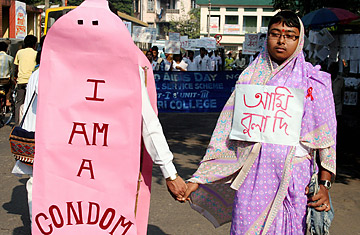
Indian students dress as a condom and the AIDS mascott "Buladi" as they participate in an AIDS awareness rally.
AIDS Sutra: Untold Stories From India
By Salman Rushdie, Siddhartha Deb, Kiran Desai, Nikita Lawani, Vikram Seth, et. al.
Anchor Books; 352 pp.
The Gist:
Sixteen of India's best known writers travel across the country to document and observe areas and communities that are most vulnerable to the HIV/AIDS crisis — transgendered men and women of the "hijra" community; sex workers and their families in Mumbai; truckers who spend most of their lives on the road; the disaffected youth who have turned to injectable drugs; and homosexual men whose lifestyle is criminalized by Indian law.
Highlight Reel:
1. Sunil Gangopadhyay on the country's thriving sex industry: "Sex workers are creatures of the dark. They exist in every society but are kept invisible. They are to be used, but not talked about." In ancient India, "if a woman was beautiful and talented; if she could sing, dance or converse intelligently, why should she waste her skills on one man alone? Why shouldn't a number of men enjoy her company? That is why a prostitute was called barnari or barangana — meaning public woman — and the source of her earnings was her skill in some performing art. [Now] prostitution has been reduced almost completely into a trading of the flesh."
2. Jaspreet Singh on the lack of care for children with HIV. "Pharmaceutical companies have little incentive to develop, or produce, pediatric medications because there are so few HIV positive children in the developed world," the author notes while recounting his visit to one of the few "care homes" that exist to take care of Indian children with HIV. Of an eight-year-old girl named Mani who lay dying there, a nurse explained, "Hospitals are the worst places for people living with HIV in this country. And Mani is a child after all. ... She likes people around her. She likes being touched."
3. Siddharth Dhanvant Shanghvi on fighting myths and ignorance: Rumors are hard to kill, and are especially deadly when they involve AIDS. Explaining why a promising young filmmaker refused treatment after being diagnosed with the disease, Shanghvi writes: "The more time he spent on the net, the more he grew vulnerable to rumors that AIDS was only a conspiracy unleashed by pharmaceutical giants to make money off homosexual men."
4. Sonia Faleiro on stigmas and labels: Of a Bombay sex worker, Faleiro writes, "If she talks to me she may call herself a 'sex worker' and 'social worker,' terms she has been taught by the NGO where she works part time. Otherwise, she refers to herself as 'randi' — a Hindi word so disparaging it has no English equivalent. Neither whore nor hooker, prostitute nor tart ... The majority of sex workers, like stray dogs, either accept their maltreatment without objection, or fail to realize it at all."The Lowdown: With its diversity of perspectives and voices, this collection provides a uniquely intimate glimpse into a disease that is either sterilized by statistics or ignored altogether. Each story reveals a government and culture that, like so many other nations, still denies HIV's impact. Yet even with its pages filled with so much injustice and pain, the book also contains its fair share of triumphant moments. An HIV-positive doctor who fought for — and won — his constitutional right to marry a "negative" woman; a group of HIV-positive children who found a home when no one else would take them, a sex worker who braves police corruption and abuse to spread condoms to her colleagues. As one women explained: "I know I am HIV positive, but it is only a condition, not a curse. I have the right to live a normal life."
The Verdict: Read
